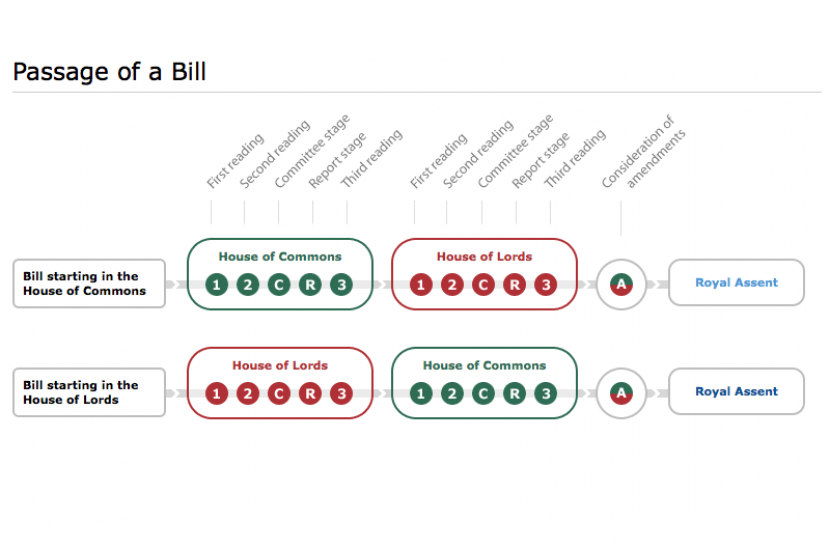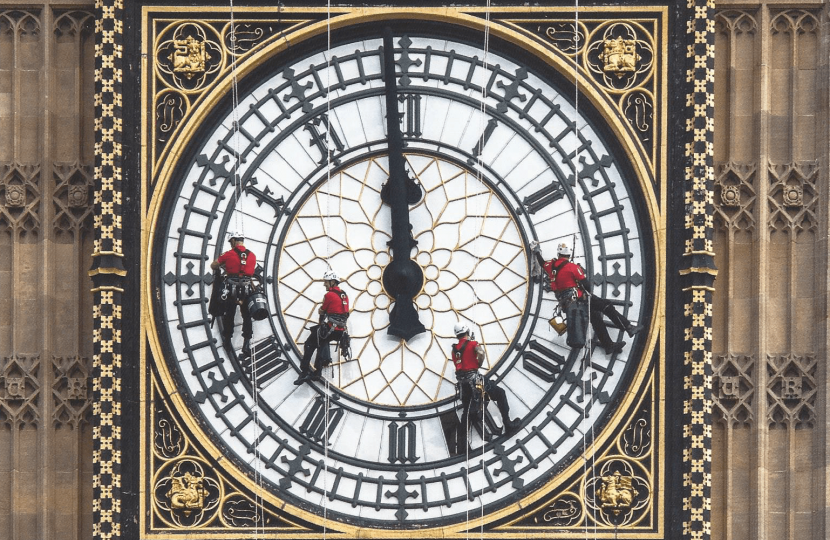Before a bill is made into an act of parliament (legislation), it has to go through a certain process. The bill can either start in the House of Commons or the House of Lords and is subject to similar a route.
If the bill were to start in the Commons, it would take the following path:
- The first stage would be the first reading which takes place without debate. This can happen at any time in a parliamentary session. The title of the bill is read out by the Member in charge of it.
- The second stage is the second reading - the first opportunity for Members of the Commons to debate the main principles and purpose of the Bill. At the end of the debate, the Commons decides whether the Bill should be given its second reading by voting, meaning it can proceed to the next stage. It is possible for a Bill to have a second reading with no debate - as long as MPs agree to it.
- The third stage is the committee stage and every clause of the Bill has to be agreed to and votes on the amendments can take place. All proposed amendments (proposals for change) can be discussed and there is no time limit on discussion of amendments.
- The fourth stage is the report stage. This gives all Members of the Commons further opportunity to consider all amendments to the Bill. The report stage usually starts 14 days after the committee stage. It can be spread over several days. If the Bill is amended it is reprinted to include all the agreed amendments.
- The fifth and final stage in the house is the third reading. In the Commons, amendments cannot be made at this stage. However, the House of Lords can do so provided the issue has not been fully considered and voted on at an earlier stage. At the end of the debate, the House votes on whether to approve the third reading of the Bill.
After the third reading in the House of Commons, the bill is then sent to the House of Lords for its first reading.
The first reading is the first stage of a Bill's passage through the House of Lords - usually a formality, it takes place without debate. The short title of the Bill read is out and is followed by an order it to be printed.
At the second reading The Government minister, spokesperson or member of the Lords responsible for the Bill opens the second reading debate. Any Member can speak in the debate so that this stage can indicate those Members particularly interested in the Bill - or a particular aspect of it - and those who are most likely to be involved in amending the Bill at later stages.
The next stage is the committee stage. Every clause of the Bill has to be agreed to and votes on the amendments can take place. All proposed amendments can be discussed and there is no time limit on the discussion. If the Bill has been altered, it is reprinted with all the agreed changes.
At the report stage, detailed line by line examination of the Bill continues. Votes can take place and any Member of the Lords can take part. If the Bill is amended it is reprinted to include all the agreed amendments.
The third reading: Unlike the Commons, amendments can be made at this stage, provided the issue has not been fully considered and voted on at an earlier stage. Amendments at third reading in the Lords are often used to clarify specific parts of the Bill and to allow the Government to make good any promises of changes to the Bill made at earlier stages.
If the Bill started in the Lords, it goes to the House of Commons for its first reading. The Commons reprints the Bill with the Lords amendments. If the Bill started in the House of Commons, after the third reading in the Lords, the amended Bill is sent back to the Commons for them to consider the Lords amendments.
Consideration of amendments
When a Bill has passed through third reading in both Houses it is returned to the first House (where it started) for the second House's amendments to be considered.
If the Commons makes amendments to the Bill, the Lords must consider them and either agree or disagree to the amendments or make alternative proposals.
If the Lords disagrees with any Commons amendments, or makes alternative proposals, then the Bill is sent back to the Commons.
A Bill may go back and forth between each House until both Houses reach an agreement.
In exceptional cases, when the two Houses do not reach agreement, the Bill falls. If certain conditions are met, the Commons can use the Parliament Acts to pass the Bill without the consent of the Lords.
Royal Assent
When a Bill has completed all its parliamentary stages in both Houses, it must have Royal Assent before it can become an Act of Parliament (law).
Royal Assent is the Monarch's agreement to make the Bill into an Act and is a formality. It is usually announced in both houses.
After Royal Assent
The legislation within the Bill may commence immediately, after a set period or only after a commencement order by a Government minister. A commencement order is designed to bring into force the whole or part of an Act of Parliament at a date later than the date of the Royal Assent.
If there is no commencement order, the Act will come into force from midnight at the start of the day of the Royal Assent. The practical implementation of an Act is the responsibility of the appropriate government department, not Parliament.


